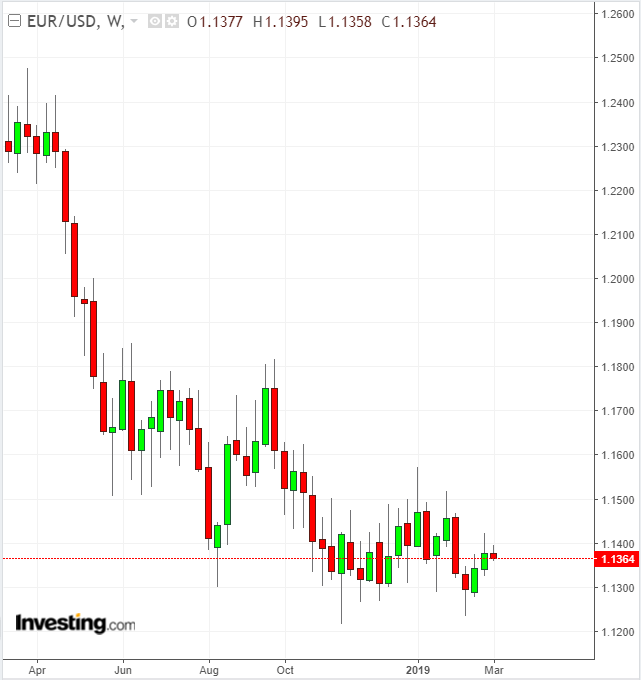by Geoffrey Smith
The European Central Bank (ECB) faces a test of nerves this week as its policy-making council meets for the second time this year.
President Mario Draghi and his team are trying to exit a course of extraordinarily loose monetary policy, needed to keep the single currency project together over the last 10 years. But the ECB is now under pressure to do something to revive flagging growth.
Both the German and Italian economies—which account for over 40% of eurozone GDP—are stagnating. The weakness of the German export powerhouse, the region’s bright spot for most of the last decade, is a particular concern, given the fragility of other sources of growth. Ifo’s business climate index, a closely-watched measure of confidence and activity, hit its lowest level since 2014 in February.
“The ECB will have to balance between pre-emptive action, which could be perceived as panic, and a relaxed wait-and-see attitude, which could be perceived as complacency,” according to ING analyst Carsten Brzeski.
Arguably, there are enough glimmers of hope in recent developments to suggest that the worst risks to the economy may not materialize. First, the threat of a chaotic ‘no-deal’ Brexit—which has played a big role in the sharp drop in eurozone business confidence—has receded, as both of the U.K.’s major parties have shifted their stances to accommodate more centrist and business opinion.
Second, the risk of an escalation in the U.S.'s trade war with China is also abating, with the Wall Street Journal reporting at the weekend that the two sides are closing in on a deal that would result in lower bilateral tariffs and enhanced U.S. access to the Chinese market.
Even so, the minutes of the bank’s last meeting said some policymakers saw it as an “urgent” priority to prepare new operations.

Various officials have flagged that the likeliest course of action will be a new round of long-term loans to banks, known as long-term refinancing operations or LTROs, that will anchor euro interest rates, and ensure enough excess euro liquidity to stop the euro rising in the foreign exchange markets. Whether or not they’ll be ‘targeted’ LTROs, meaning tied to banks’ lending activity like the ones they’ll replace, isn’t clear (ING’s Brzeski says it’s not important anyway).
But the ECB could conceivably restrict itself this week to just preparing the groundwork for such an operation, rather than actually pulling the trigger, according to a survey of economists by Bloomberg. Analysts at Nordea Markets say the details of any future LTRO will depend on what signal the ECB wants to send. It could anchor market rates for as long as four years by offering the new loans at a fixed rate, or it could leave the door open for an earlier move to a tighter policy stance by making the new loans float in line with its benchmark refinancing rate, which has been at 0% since 2016.
Past experience suggests the latter is more likely, as it doesn’t tie the central bank’s hands so tightly for the future. That’s important, given that the bank is due to get a new president in November.
German central bank chief Jens Weidmann is trying to pre-empt any undue generosity. At a press conference last week, he was quoted by Dow Jones as saying that a fixed-rate tender could impair monetary policy, while a long maturity could mess up the bank’s forward guidance, the bank’s most sensitive policy tool now that it has stopped its net asset purchases.
“The ECB is probably not willing to make the terms of its new liquidity operations so attractive that they would lead to an actual increase in excess liquidity,” Nordea’s Jan van Gerich said. For that reason, he and his colleagues say it’s “hard to imagine a much weaker euro” when the ECB finally acts.
Part of its reluctance is due to the likelihood that demand for any new LTRO will be concentrated among Spanish and Italian banks. That once again exposes awkward truths about their ability to survive without the ECB’s life support—six years after the worst of the euro crisis and four years after the ECB became the eurozone’s top bank supervisor. According to Moody’s Investor Service, ECB money funds 6% of Spanish and Italian banking system assets.
Regulation approved as part of the so-called Basel III accords after the 2008 financial crisis requires banks to have minimum levels of funding lasting over 12 months, the so-called Net Stable Funding Ratio (NSFR). As the remaining maturity of outstanding ECB LTROs falls below 12 months later this year, banks will no longer be able to count them in meeting their NSFR requirements.
“The question of whether institutions to meet their regulatory obligations should play no role in our monetary policy decisions,” Weidmann said. His French counterpart Francois Villeroy de Galhau has also said much the same thing.
Objections from those two alone are probably enough to stop decisive action this week. As a result, it will once again come down to Mr. Draghi’s communication skills to convince markets that the ECB is serious about supporting growth even while it does nothing. Anything less could result in a fresh sell-off in Spanish and Italian bank debt and equity, and wider credit spreads—the “unwarranted tightening” of conditions that the ECB wants to avoid at all costs.
It’s a familiar balancing act but, with the eurozone fast running out of steam, the stakes are higher now than they have been for some time.
